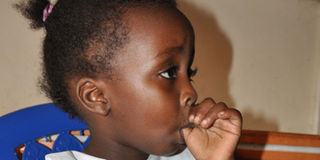Does thumb-sucking affect teeth?

A young girl sucks her thumb. The habit can affect teeth alignment in the jaw. Photo by Rachel Mabala
What you need to know:
But after developing permanent teeth, the thumb-sucking may affect the proper growth and alignment of teeth in the jaw.
A reader wrote to me inquiring whether it is safe for a child to suck their thumb, and if this act does not affect the development of the teeth. Thumb-sucking is a natural reflex and a common habit among young children.
It makes them feel happy, relaxed and secure. However, it is also common that whenever children are stressed, bored, tired or sleepy, they resort to sucking their thumbs.
In the early stages, when a child still has milk teeth, the habit is not harmful.
But after developing permanent teeth, the thumb-sucking may affect the proper growth and alignment of teeth in the jaw. It can also lead to changes in what is known as the anatomical structure of the palate (roof of the mouth). The intensity of sucking is one of the predisposing factors that can show if a child will develop dental problems in the future or not.
Those who rest their thumbs passively in their mouths are less likely to develop complications.
Children are most likely to stop sucking their thumb before they turn four, and by the time they start to develop permanent teeth at six, they are likely to have abandoned the practice completely.
This is because at this age, their brains are preoccupied with several other things, including spending more time playing with peers.
Parents, however, should monitor children who suck their thumbs to ensure they do not continue with the habit beyond the age of four. If a parent notices changes in the alignment of a child’s teeth, or if thumb-sucking persists, a visit to the dentist is recommended.
Tips
Here are a few tips that parents can follow to help stop their children from the habit of thumb-sucking.
•Praise your child whenever they do not engage in the habit.
•Children often suck their thumbs when they feel insecure, anxious or need comfort. Focus on correcting the cause of such anxiety and provide comfort.
•For older children, involve them in activities they can undertake to stop the habit.
•A dentist can offer encouragement to the child and explain what could happen if they do not stop the habit. If this persists, the dentist can prescribe the use of a mouth appliance.
•The child’s thumb can also be bandaged at night while they sleep.
The writer is a dentist
[email protected]




